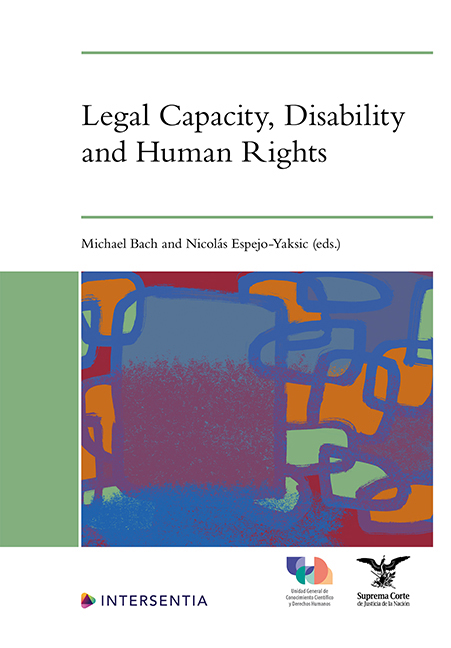Book contents
- Frontmatter
- Foreword
- Acknowledgements
- Contents
- List of Cases
- List of Contributors
- Legal Capacity, Disability and Human Rights: Introduction
- PART I HISTORICAL PERSPECTIVES AND THEORETICAL FRAMES
- PART II LAW REFORM: COUNTRY AND REGIONAL PERSPECTIVES
- PART III LEGAL QUESTIONS, PERSISTENT CHALLENGES
- Index
- About the Editors
Mental Capacity in Hong Kong: Inconsistencies, Uncertainties, and the Need for Reform
Published online by Cambridge University Press: 03 April 2024
- Frontmatter
- Foreword
- Acknowledgements
- Contents
- List of Cases
- List of Contributors
- Legal Capacity, Disability and Human Rights: Introduction
- PART I HISTORICAL PERSPECTIVES AND THEORETICAL FRAMES
- PART II LAW REFORM: COUNTRY AND REGIONAL PERSPECTIVES
- PART III LEGAL QUESTIONS, PERSISTENT CHALLENGES
- Index
- About the Editors
Summary
INTRODUCTION
In the area of mental health and capacity law, Hong Kong lags far behind many jurisdictions in terms of its compliance with international human rights standards. To this day, the Hong Kong Government's approach to issues around mental capacity continues to be heavily based upon the medical model of mental illness and disability, which equates functional impairment with the loss of legal capacity and stresses the need for psychiatric intervention and rehabilitation. This is despite resulting inconsistencies with norms set out in the various international human rights treaties applicable to Hong Kong, including the International Covenant on Civil Political Rights (ICCPR) and the International Covenant on Economic, Social and Cultural Rights (ICESCR), which had been ratified by the United Kingdom (and whose applicability was extended to the territory) prior to Hong Kong's handover to the People's Republic of China (PRC). BoThtreaties are now entrenched in the Hong Kong Basic Law, with the ICCPR further domesticated through the Hong Kong Bill of Rights Ordinance (HKBORO). In August 2008, the PRC ratified the Convention on the Rights of Persons with Disabilities (CRPD), whose applicability was again extended to Hong Kong. However, the provisions of the CRPD have not been incorporated into domestic law and are, as such, not directly litigable in local courts.
This chapter looks at various legal provisions regulating mental capacity in Hong Kong and evaluates them against requirements set out by Article 12 of the CRPD, highlighting areas which demonstrate inconsistencies, uncertainties, and a need for reform in light of current international human rights norms and standards. The next section provides an overview of the development of Hong Kong law in the area, highlighting changes in its approach to mental health and capacity through the past decades. Section 3 examines how mental (in)capacity is defined in Hong Kong law while sections 4 to 6 closely examine the regulation of (civil) capacity in three significant areas: medical treatment of those with out capacity to consent, substitute decision-making in the forms of guardianship and management of property by the Court, and advance decision-making.
- Type
- Chapter
- Information
- Legal Capacity, Disability and Human Rights , pp. 277 - 298Publisher: IntersentiaPrint publication year: 2023

